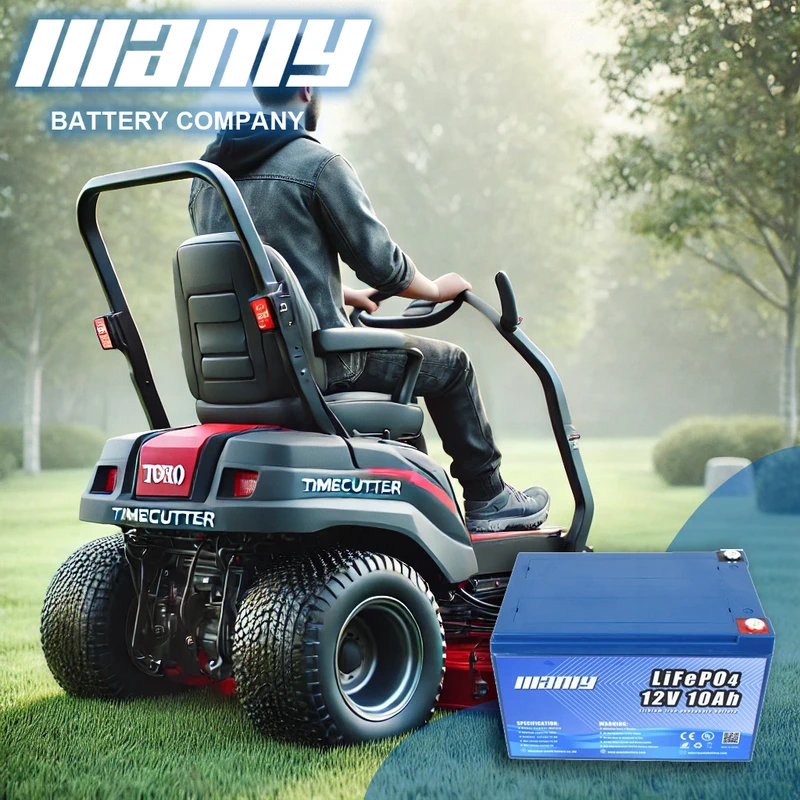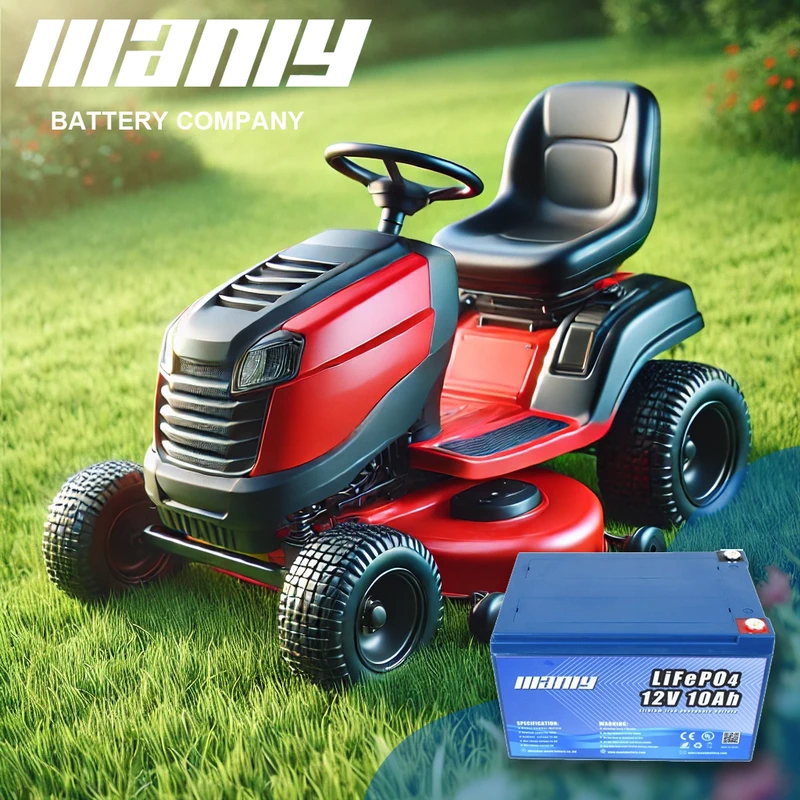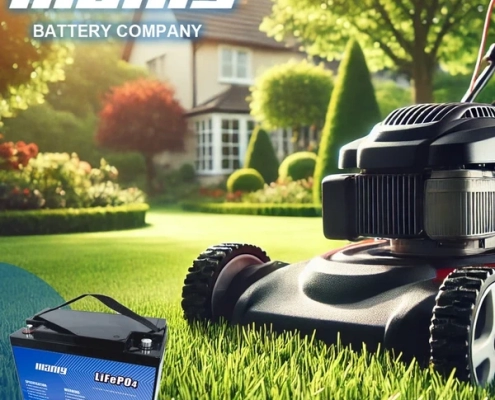What Voltage Should a Lawn Mower Battery Have?
Table of Contents
- What Voltage Should a Lawn Mower Battery Have?
If you want to replace your lawn mower battery, understanding its voltage is one of the most crucial steps. After all, the lawn mower battery voltage isn’t just a number—it’s the power behind your mower’s ability to start, run smoothly, and handle challenging lawn tasks. So, let’s break it down, shall we?
Common Voltage for Lawn Mower Batteries
When you open a lawn mower’s hood, one of the first questions you’ll likely have is, “Is my mower using a 6-volt or a 12-volt battery?” The answer depends on the size and type of your mower.
1. 12-Volt Batteries: The Heavy Hitters
For most riding mowers, garden tractors, and even some larger push mowers, the 12-volt lawn mower battery is the go-to. These batteries pack enough punch to start larger engines and power through bigger lawns without sweat. If you’ve got a more extensive lawn or a riding mower, you’re likely looking at a 12-volt lawn tractor battery voltage designed to handle the added power needs.
2. 6-Volt Batteries: The Smaller, Steady Players
Conversely, 6-volt batteries are the usual suspects for smaller push mowers. These batteries may not pack as much power as their 12-volt counterparts, but they’re perfect for smaller engines that don’t need that much juice. These 6-volt lawn mower batteries are a more affordable and lighter, ideal for maintaining smaller lawns without putting a dent in your wallet.
To ensure you’re choosing the right battery, always check your mower’s manual or the battery’s label—it’s the easiest way to confirm the voltage your mower needs.
What Type of Battery Does Your Mower Use?
1. Gas-Powered vs. Battery-Powered Mowers: Different Needs, Different Voltages
Not all mowers are created equal. The voltage of a lawn mower battery can vary depending on whether it is gas-powered or battery-powered.
- Gas-powered Mowers: These usually run on 12-volt batteries, which give the engine the cranking power it needs to start. If you’ve got a riding mower or a larger machine that can handle more power, you’ll typically find a 12-volt lawn mower battery doing the heavy lifting.
- Battery-Powered Mowers: If you’re all about that electric life, your mower may be running off a lithium-ion battery or a lead-acid battery, and here’s where things can get a little interesting. These mowers can have a range of voltages, from 20 volts to 80 volts in some cases, depending on the model and power needs. If you’re working with a smaller, electric push mower, it might use a 12-volt battery, but larger battery-powered models will likely have higher voltages to deliver more torque and runtime.
Why Does the Voltage Matter?
Now that we know the different types of voltages, let’s dive into why this matters. After all, it’s not just a number you write on a shopping list. The voltage of a lawn mower battery affects everything from how efficiently your mower runs to how long it will last.
1. The Power to Start Your Mower
First, a higher voltage means more cranking amps, which gives your mower the juice it needs to start, especially on cold mornings when it just doesn’t want to cooperate. That’s why you’ll often see 12-volt batteries in gas-powered mowers—they need the extra amps to get the engine turning over. If you’re replacing a 6-volt lawn mower battery, don’t just drop a 12-volt battery in there without checking compatibility. A mismatch could cause your mower to run inefficiently or damage the wiring.
2. Battery Life and Run Time
If you’re using a 12-volt battery, it’s likely to give you longer run times, especially with larger mowers. More voltage usually translates to a battery that can sustain more extended periods of use before needing a recharge. On the other hand, 6-volt batteries might need more frequent recharging, but they’re perfectly fine for smaller tasks and yards.
3. The Efficiency Factor
Choosing the correct voltage doesn’t just affect the battery life—it impacts your mower’s overall performance. An underpowered battery can result in sluggish starts, stuttering performance, or even the battery dying faster than you’d expect. So, ensuring you have the proper lawn mower battery voltage ensures that your mower performs as it should, season after season.
How to Test the Voltage of Your Lawn Mower Battery
So, how is your battery working correctly? Simple! Testing your lawn mower battery voltage is quick and easy; all you need is a multimeter. Here’s a quick step-by-step guide:
- Step 1: Safety First!
- Always wear gloves and ensure the mower is turned off before handling the battery. You don’t want to mess with any electrical components when there’s a risk of shock.
- Step 2: Find the Battery
- Pop open the battery compartment and locate your battery. You’ll typically find it near the back of the mower, in a compartment that may require a screwdriver to open.
- Step 3: Use a Multimeter
- Set your multimeter to measure DC voltage (direct current), and connect the red lead to the positive terminal and the black lead to the negative terminal.
- Step 4: Read the Multimeter
- Check the reading on the multimeter. A fully charged 12-volt battery should read around 12.6 to 13.0 volts. A 6-volt battery should show around 6.3 to 6.5 volts when fully charged. If your readings are lower, your battery may be out.
How to Choose the Right Size Battery for Your Lawn Mower
When it comes to replacing your mower’s battery, it’s not just about voltage—it’s also about size. The battery should fit snugly in the compartment, and its power rating (measured in amp-hours) should be adequate for your mower’s needs. Too big or too small, you’ll run into problems with fit or performance.
A 12-volt battery is often the right choice for larger mowers or lawn tractors, while smaller mowers can quickly get by with a 6-volt battery. Always check the manufacturer’s recommendations for size and voltage to avoid compatibility issues.
Wrapping Up: Choosing the Right Voltage
In summary, the voltage of a lawn mower battery plays a key role in how your mower performs and lasts. Whether you’re going for a 6-volt battery for a smaller push mower or a 12-volt battery for a more powerful lawn tractor, knowing the correct voltage for your mower is essential for maintaining its efficiency and longevity. Always double-check the specs, and don’t hesitate to contact a professional if you’re unsure.
Now that you’re familiar with lawn mower battery voltage, you’re ready to pick the perfect replacement to keep your mower running smoothly all season long!
FAQ
1. Is a lawn mower battery 6 or 12 volt?
Lawn mower batteries typically come in two standard voltages: 6 volts and 12 volts. The voltage required depends on the size and type of mower. Smaller push mowers often use 6-volt batteries, while larger riding mowers or lawn tractors typically require 12-volt batteries for the extra power needed to start and run the engine.
2. How long does a 12 volt lawn mower battery last?
Depending on usage, maintenance, and storage conditions, a 12-volt lawn mower battery can last between 3 to 5 years. Regularly charging the battery, cleaning terminals, and ensuring proper storage during the winter can help extend its lifespan. Extreme temperatures and lack of maintenance may reduce its life expectancy.
3. What kind of batteries are used in lawn mowers?
Lawn mowers commonly use two types of batteries: lead-acid batteries and lithium-ion batteries. Lead-acid batteries are more common in older models and larger riding mowers, while newer, battery-powered mowers often use lithium-ion batteries due to their lighter weight and longer lifespan. The choice between these depends on the mower’s design and intended use.







